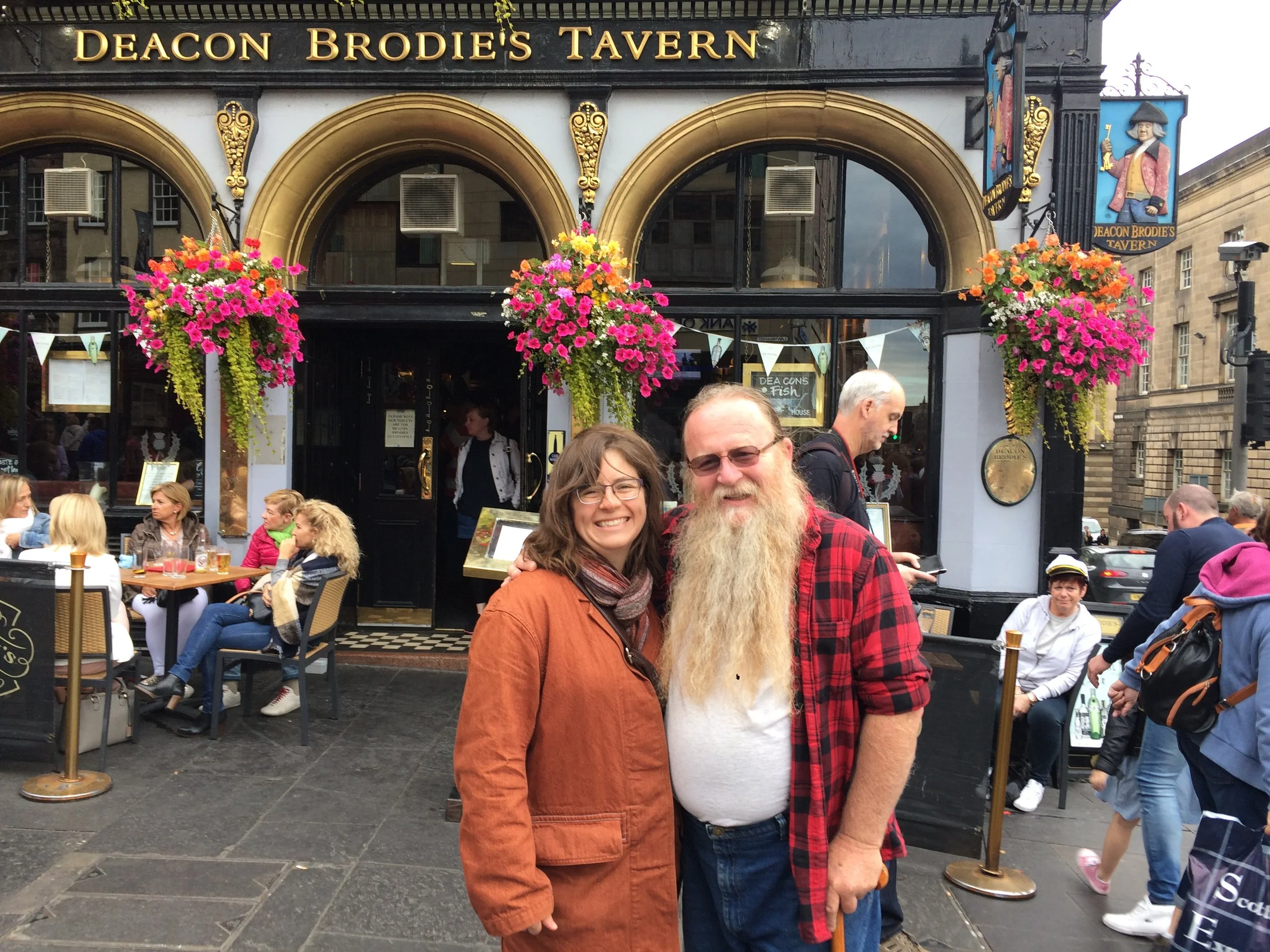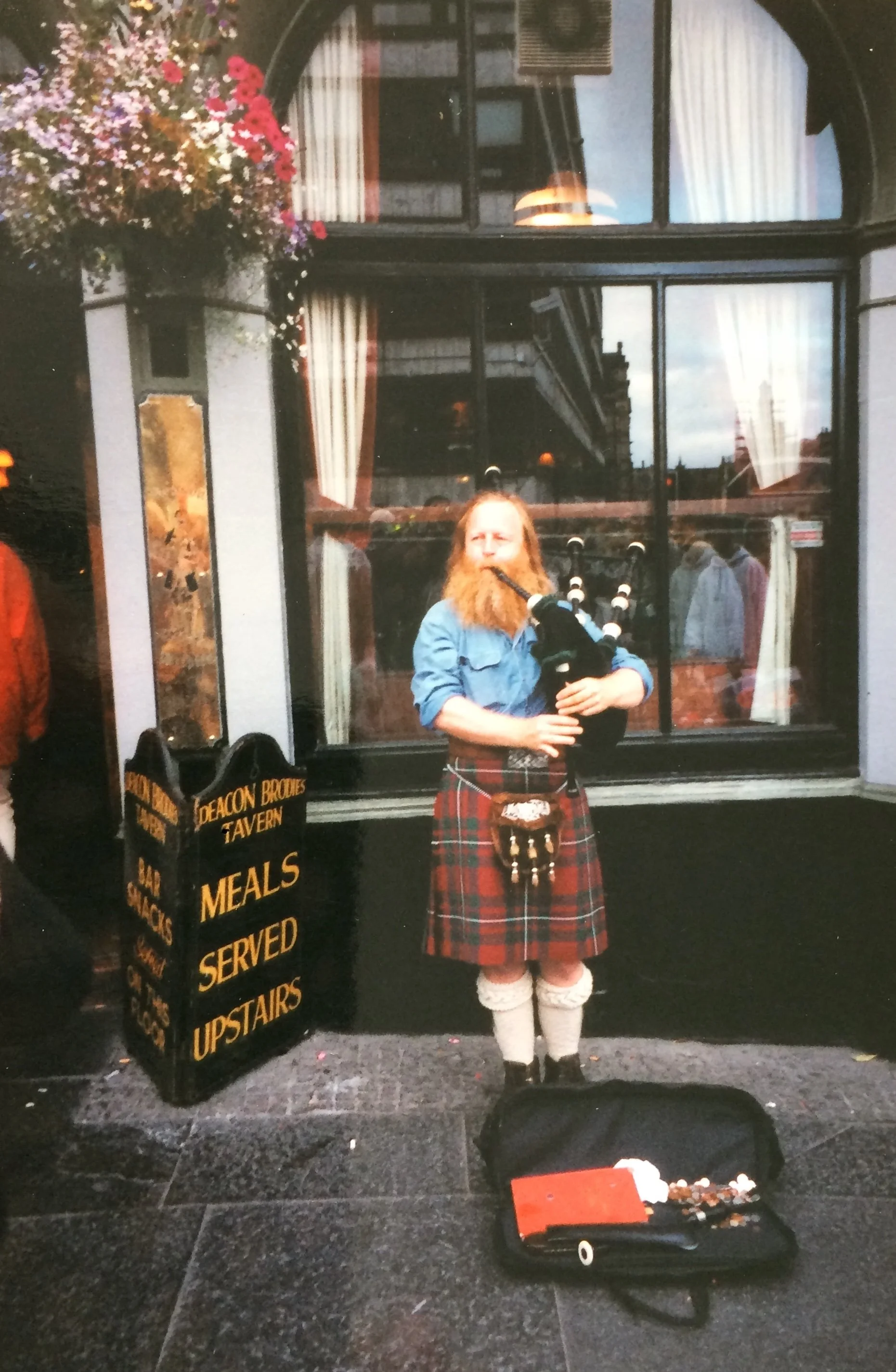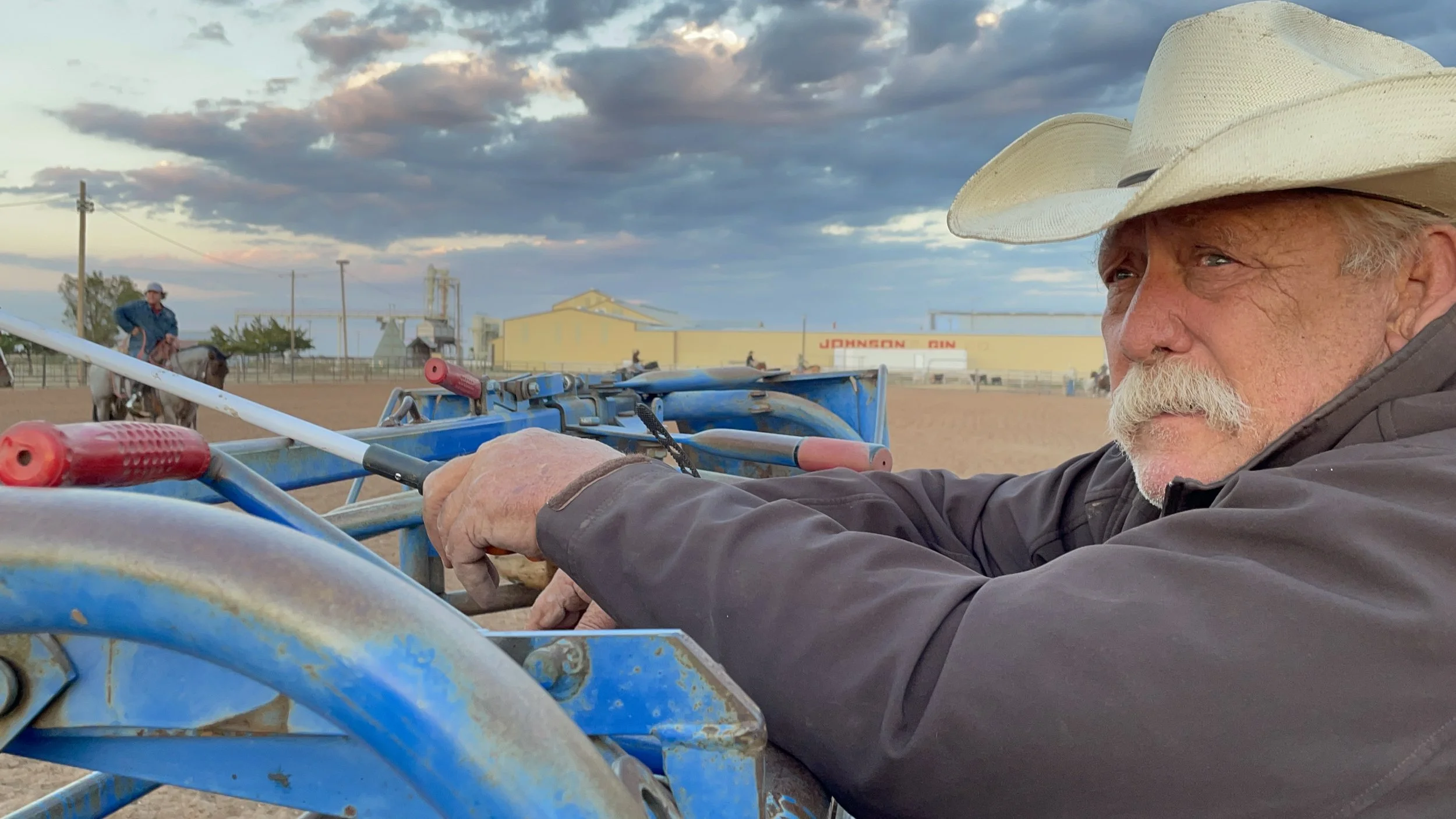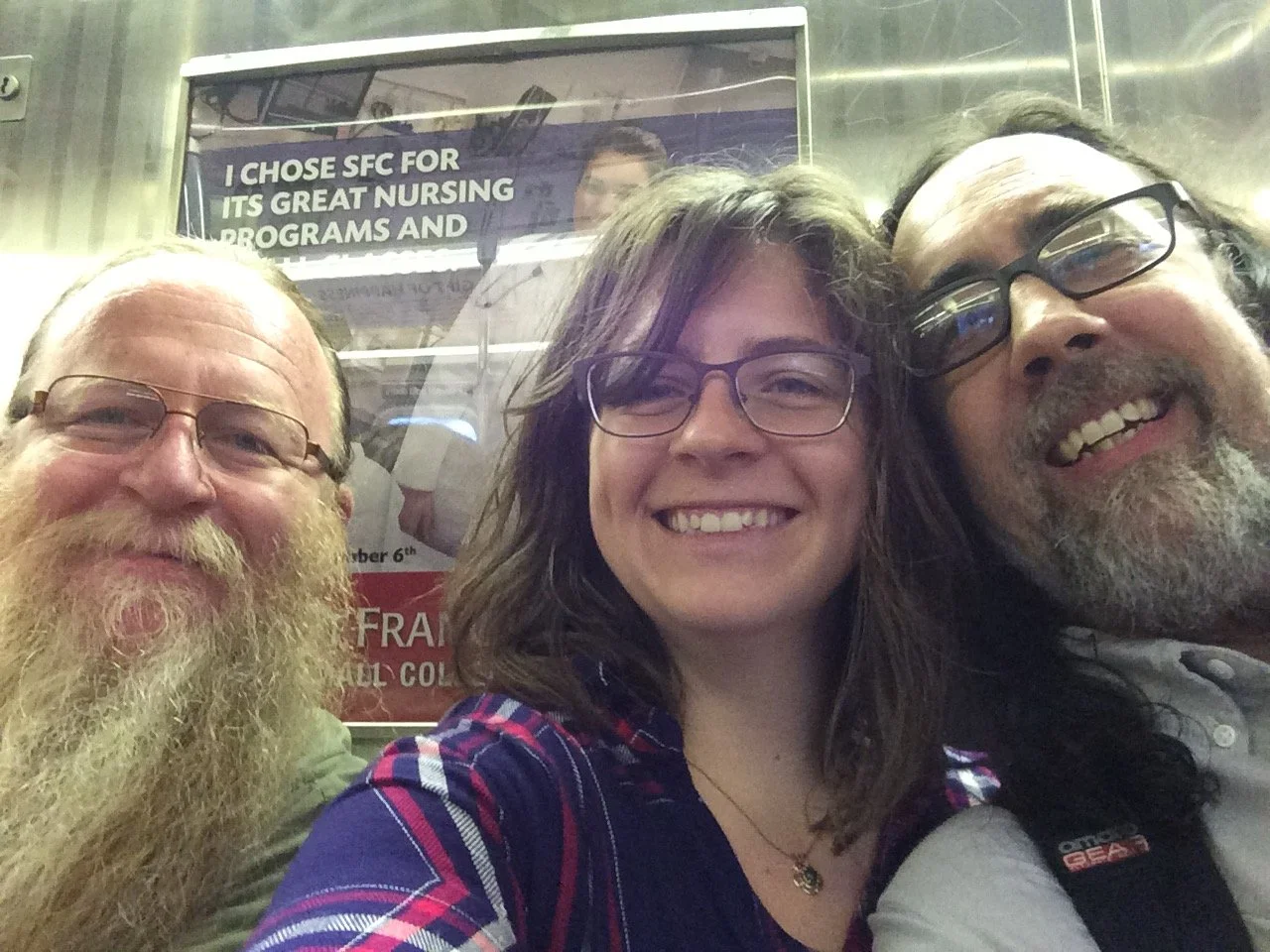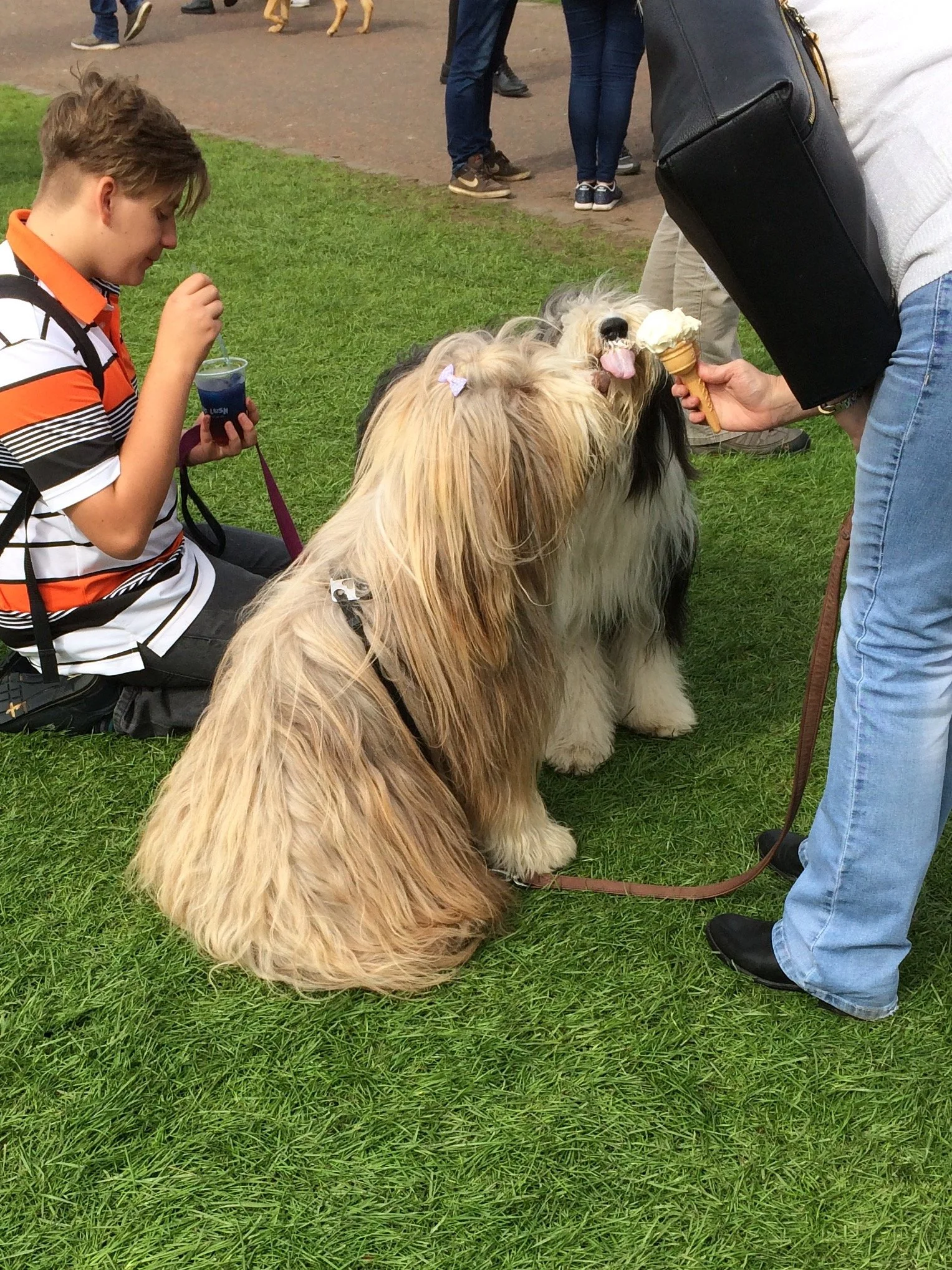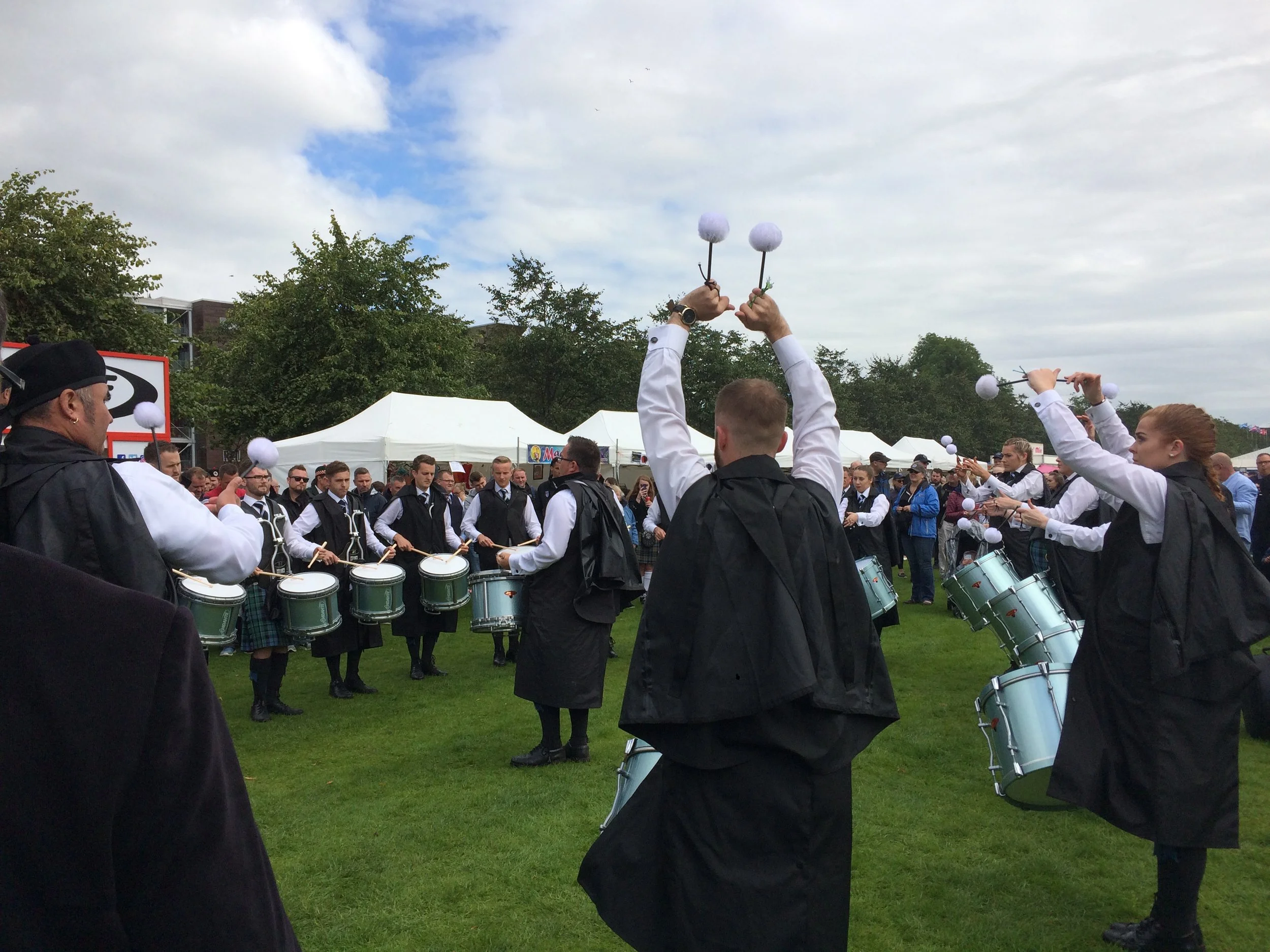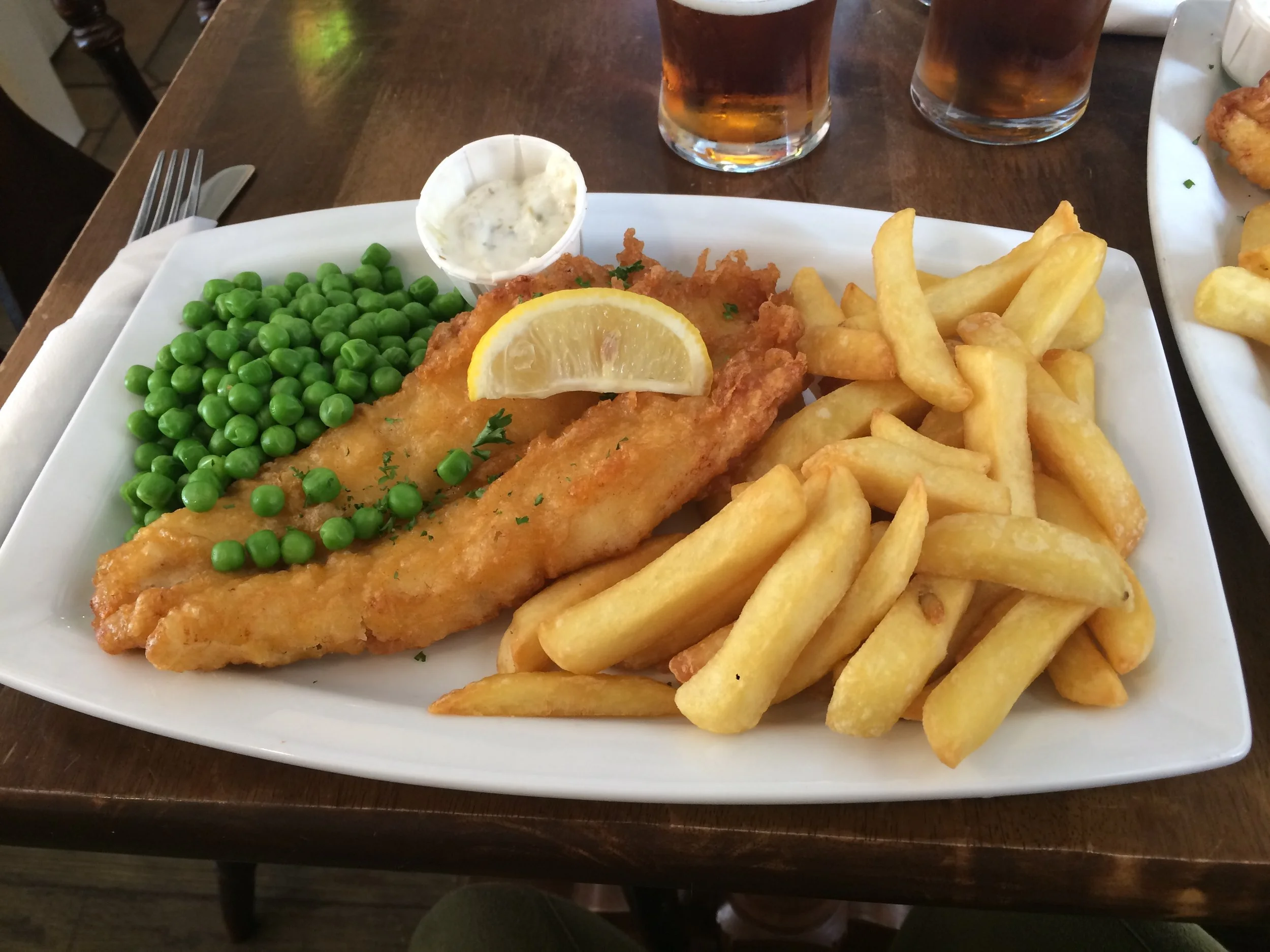Scotland Part 1: Plans
Rose Thomas and her dad (grandfather’s ghost not pictured)
It was quiet at the Brooklyn wine shop, the late summer light our only customer. My manager and I had nothing to do but discuss my big trip.
It was my first job in wine retail after sommelier school. I drank enough discounted bottles to swirl away the crummy pay. Now I had asked to take almost three weeks off. I didn’t get fired for this, but I could tell it was a sin.
“Where all are you and Bob going in Scotland?” my manager asked.
“We’re flying into Edinburgh. We’ll have a drink at my dad’s favorite bar, then we’ll head to Glasgow for the world pipe band championship. We’ll drive around, then end up in Oban, at the piobaireachd competition. That’s like solo classical bagpipe music. Actually older than classical–”
“Yes. You told me.” my manager cut it in. “But where else are you going? What hotels are you staying in?”
I voiced an uncertain “Uh…,” taking the cue from his expression to feel embarrassed.
“You’re going for almost three weeks!” he exclaimed. “You really haven’t planned anything?”
Personally, I thought knowing how to pronounce piobaireachd was pretty good preparation for my pilgrimage to the homeland of my father, a master piper as well as a master falconer, a brewer of mead, a weaver of cloth, and a composer of blistering limericks. Besides, he was coming with us.
I’d been told my grandfather’s ashes were interred within the walls of Deacon Brodie’s pub in Edinburgh. I knew in my heart that raising an amber dram to my grandfather’s ghost with my sweetheart and my dad before driving to Glasgow to bathe in the drones and drums of my people was the perfect plan. But my manager had a strong case of “you’re doing it wrong” face, and it affected me.
I called my dad.
“Hey dad.”
“Hiya dearie.”
“Listen, what are we doing in Scotland?”
“We have a pint at Deacon Brodie’s, then we go to Glasgow for the pipe band championship, have some adventures, then end up in Oban for the piobaireachd.”
Pee-ber-och, a little cough at the end.
O-bun, hard stress on the first syllable.
I was a mixologist before I turned to wine, but it was my dad who educated me about Scotch. He taught me to pronounce Laphroaig, a whisky so smoky my first swallow brought on a brief vision that my blood had been replaced with a campfire. He taught me how to unlock the aromas from the surface of the liquid with a single drop of water. It’s La-froy-uh, no hard ‘g’, but no one ever understood that at American bars, so I gave up saying it right with everyone but him.
“Yes, I know,” I said, channeling my manager’s anxiety that I hadn’t done my homework. “But what else are we going to do?”
My father, Tom, spent the formative years of his childhood in the land of his Scottish stepfather, Mac Campbell, along with his Boston-bred mother and his two half siblings. In the hamlet of Blaringone, outside of Dollar, little Tom chased rabbits, picked up the Doric dialect, and discovered the one talent that would hold his attention for a lifetime: the bagpipes. He’d join the US Navy, move and marry many times, but he never stopped playing hornpipes and reels on the Highland pipes.
Tom busking at Deacon Brodie’s in 2001
I didn’t meet my father until I was 24. When I tracked him down, on Myspace, he was living in Amarillo. My dad is so many people’s best friend. When I finally got the chance to have him be mine, it was a request from one of his “top 8 friends” that let me know he had gotten the letter I had written, the one that said “I’m pretty sure you’re my father.” That top friend was a Texan named Bruce with a cowboy hat and a handlebar mustache.
Bruce in 2023
When I showed up in Amarillo, Bruce was my welcoming committee. His first story was about the road trip he and Tom took to Scotland to bury Mac Campbell. They’d started in Edinburgh, watched the world pipe band championship in Glasgow, and ended up in Oban at the piobaireachd competition. In between, they had adventures. Absinthe moonshine, talking to seagulls adventures. They adopted an incontinent hedgehog named Hamish. They gate-crashed a party for the Duke of Argyll. A girl with a debilitating condition was briefly healed by bagpipe music.
In short, they ran out of time to bury my grandfather. They’d shown up at the cemetery on the last day, only to be turned away for lack of the proper paperwork.
“Well, that’s unfortunate,” drawled Bruce’s magnificent mustache.
Bruce and Tom were back at Deacon Brodie’s. They stared at the hard plastic box of my grandfather’s ashes, wrapped in bedraggled brown paper.
“He was unsettled, Tom,” said Bruce. “All those times he fell off your mantle in Amarillo.”
He prounced it Amarilla.
“I know, Bruce,” said Tom. “But what are we gonna do now? Mail his ashes back to Texas?”
Archie the barman was well acquainted with their quest. He turned around.
“Good lord, you can’t put your father at the mercy of the United States mail!” Archie exclaimed. “With the luck you’ve got, he’ll wind up in Dubuque!”
Tom and Bruce sipped their Guinesses, forlorn.
“Oh, give him here,” said Archie. “He’ll be safe on this shelf until you make it back.”
Guarded by a capable barman in an establishment named for a disreputable cabinet-maker, my grandfather’s ghost was in fine station. An impromptu wake arose, with my dad on the pipes.
An old man entered through the side door.
“Who died?” bellowed the old man.
“Mac Macready Cambell!” answered Bruce.
“Mac! I knew ‘im from the Royal Bank!
Mac and my grandma, Deborah, used to have lunch every day when they worked in Edinburgh. They’d swing by for a gin after work before taking the train back to Clackmannanshire. The old man called everyone who remembered Mac and they all came down to the pub.
Someone ordered a dram and put it next to Mac’s box. Whenever it evaporated, Archie poured him another. And so my grandfather rested in whisky peace, at least until the remodel that may or may not have interred him in a soffit.
I never met my grandfather, but my dad says Mac was so stubborn that he and another driver faced off for hours on a narrow country road while Deborah and the kids waited to see which man would back up and let the other pass.
This is apparently a Scottish trait. When I tried to make Tom let me plan our trip, he would only repeat that we’d hear the pipe bands in Glasgow on August 12 and the piobaireachd in Oban on August 23. I couldn’t get him to name a single town where we might stop in between.
He only agreed to go fly fishing.
I threw myself into internet research on the one plan we had. My dad admitted there was good fishing in the river Spey, the namesake of Speyside whisky.
“It isn’t smoky at all,” he told me. The opposite of Laphroiag and the other intense Islay whiskies from the Hebrides.
Eye-lay.
When we got on the plane, our itinerary was still a bagpipe trout sandwich. We did have lodging planned for the first night, but the Edinburgh Fringe Festival was on, and with all the weirdos about, “my friend Liz” wasn’t enough of an address for a certain humorless customs agent. My sweetheart, my dad and I are all musicians. Bob and I play guitar and I write songs. We all look a little interesting, especially my dad with his Gandalf beard and inclination to convey information in maximum color. Our plan to amble around the country was as unbelievable to the customs agent as it had been to my manager. I really think we might have been deported if there hadn’t been a shift change.
Suspiciously spontaneous en route to Scotland
Instead, we made it to Deacon Brodie’s and raised a glass to Mac. I kept trying to ask for Mac’s exact location in the walls, but my dad kept misdirecting me. My grandfather has ascended into legend, and that’s where he must remain.
We had just enough time to take in Edinburgh’s scholarly, sand-colored architecture before it was time to drive to the Glasgow green. The pipers and drummers came from all over Scotland and the world. Tartan kilts and matching socks gleamed in the welcoming sunshine. A spectator fed an ice cream cone to two sheepdogs adorned with little bows. The din was glorious.
I think they like the music!
Before I met my father, no one told me that he was a musician like me. We played a show together when I first went out to meet him in Texas. When he blew up his pipes after I played my guitar at the 806 Coffee Shop, I knew he was good. I also loved the sound.
RT and Tom playing a show together the weekend they met, 2009
My kinship with my father was an obvious and blood-filling joy I hadn’t known that I’d lost. We have the same eyes, the same messiness, the same need to know everything, the same immodest, mad-scientist skills in the kitchen. We have the same somewhat rare compulsion to give the world new songs to sing.
There in Glasgow, that homecoming drone my father played for me in Texas was multiplied by hundreds. All the drums ordered us all to fight for our clan, or at least, to dance. After the competition and an afternoon in the beer tent, the musicians form a giant mass band on the green and play Scotland the Brave. I caught up with my lost culture in one massive blast of sound.
World Pipe Band Competition, Glasgow Green, 2017
In the beer tent, I quizzed a merry dame about the terminology I’d seen on billboards on the road to Glasgow.
“What exactly,” I asked, “is ‘proper food’?”
“Chips,” the woman answered without hesitation. She pronounced it like chehps.
“What would improper food be, then?”
“Macaroni!”
I was about to learn that macaroni and cheese happens to be a popular pub food in Scotland, but my god, she was right about the fish and chips. The version I’d tried in America was nothing next to the crispy-light battered whitefish and dreamy potato planks I ordered for lunch on the road every day for the next three weeks.
Proper food
My dad, who had refused to name a single additional town he’d like to visit on our tour, was suddenly unveiled as an expert tour guide. He knew the full history of Arbroath smokies, a culturally protected method for preserving haddock, but didn’t mention it until we stopped for lunch in Arbroath. In Cullen, he recommended the fish chowder like a local and explained that it’s called “skink.”
From Inverness to Banff to Orkney, my father systematically conspired with the misty heather of fortune and the salty air of pure charisma to persuade me that the proper way to travel is to plan nothing. Instead, roll into town, order a pint, spit a limerick or strike up a tune until you’re friends with everyone in sight.
And yes, we went fly fishing.

